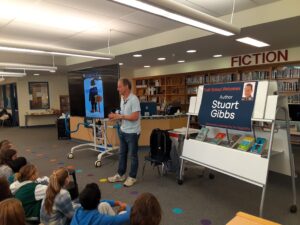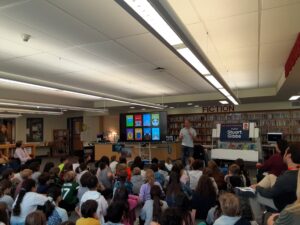 Some author visits can leave an impression that lasts a lifetime.
Some author visits can leave an impression that lasts a lifetime.
Nine years ago, author Stuart Gibbs only had five books published, but when he came to Todd School, his visit left a big impression on student Daniel Caspar, who recently reached out to Gibbs.
“Daniel recommended my books to his college professor’s daughter and together, he and the daughter sent me a video,” Gibbs said.
Fast-forward to today – Gibbs has now published 35 books, many which have appeared on the best-seller list.
During a visit to Todd this week, generously funded by the PTA, he met with fourth and fifth grade students, who were fascinated as they heard him share some of his inspiration for his book series.
Gibbs said he knew he wanted to be an author at a young age, but when he went to college, he decided he was going to study animals, which was another subject he was passionate about. He studied field biology, which involved a lot of research at the Philadelphia Zoo.
“I picked an animal that was not widely known at the time – the capybara – and my professor told me to learn more about the capybara at the zoo, so I spent a lot of time there. I got to see how zoos operate behind the scenes and speak to the biologists who work there,” he said. “I saw that a zoo was a really fascinating place to set a story, and I began thinking about different ideas that can be set at a zoo. That is how I came up with the idea of a mystery series called “Fun Jungle” which is set at a zoo that is also like a theme park. I like that when I am writing this series, in addition to being a writer, I get to be a biologist because I incorporate interesting facts about animals.”
A few years ago, Gibbs’ publisher asked him if he was interested in collaborating with an illustrator.
 “I had an idea that I came up with 10 years earlier, but I did not know what to do with it,” he said. “My children watched a lot of Disney movies when they were young, and while watching a movie about one of the princesses, I came up with the idea to write about people who lived in a kingdom who were peasants, as opposed to royalty.”
“I had an idea that I came up with 10 years earlier, but I did not know what to do with it,” he said. “My children watched a lot of Disney movies when they were young, and while watching a movie about one of the princesses, I came up with the idea to write about people who lived in a kingdom who were peasants, as opposed to royalty.”
This is how Gibbs came up with his “Once Upon a Tim” series. The books are about a boy named Tim, who does not like to be a peasant and decides to volunteer to be a knight and go on many adventures.
For the popular “Spy School” series, which is about a kid who goes to the CIA’s top-secret academy of espionage, Gibbs’ inspiration was James Bond. He watched his first James Bond movie when he was in sixth grade, and subsequently wrote fan fiction about Jimmy Bond, Agent 006 and a Half.
“I came up with the idea that Jimmy needs to go to a top-secret spy school to learn how to be a spy,” he said. “In order to write a story, you first need to have an idea in your head; authors can be thinking about those ideas for a long time. It can take months, years or even decades, and this was one of those stories that I had been thinking about for decades. Over the years I kept coming back to the idea and tried to figure out how to tell that story.”
According to Gibbs, inspiration can come from anywhere.
“Ask your parents to take you to places such as the zoo or a museum, to find inspiration,” he said. “The more curious you are, the more inspiration will strike you.”
After his talk with the students, Gibbs answered students’ questions, such as why he likes writing so much, whether he gets an urge to write when he sees a blank page, and how long it takes him to write a book.
In addition to writing, Gibbs has also created a series of videos called Mission: Write, where he gives children tips about writing, such as building characters and telling a story.
“The videos are for creative writing, but they can be used for other types of writing as well,” he said.
A prolific writer, with several books coming out each year, Gibbs has a rigid regimen when it comes to writing.
“I like to have a separation, so I only write at home, never when I am travelling,” he said. “Sometimes I write on the computer and sometimes I do research and speak to experts, for example at the Bronx Zoo.”
Gibbs considers writing his dream job and said he would be writing even if he did not make a living out of it. He especially loves writing for fourth and fifth graders.
“They are a fun target audience to write for,” he said. “One of the reasons that it is so great to write for this age group is that they are great readers, they are very enthusiastic and always have questions.”






